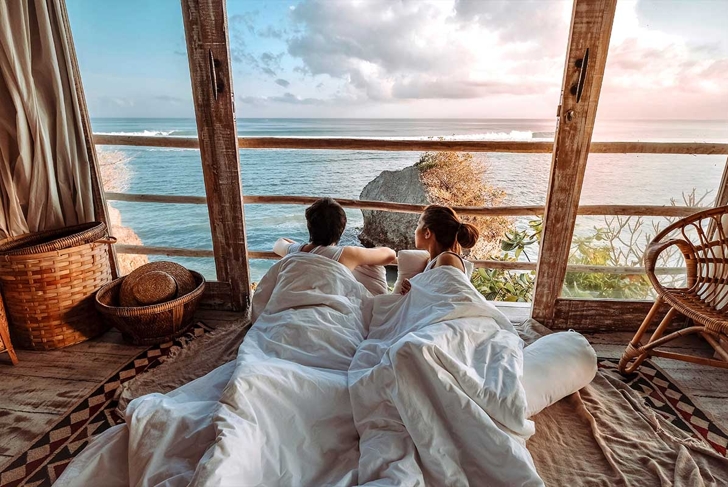
Once upon a time, the hallmarks of a fabulous vacation were sampling an abundance of local cuisine, plenty of sightseeing, and bar hopping until dawn. Roll forward to life with a kid, a dog, and a plethora of professional responsibilities, and the vibe of my ideal destination is sublime solitude. I am clearly not alone in this preference because sleep tourism is a travel amenity that’s now in high demand.
What is sleep tourism?
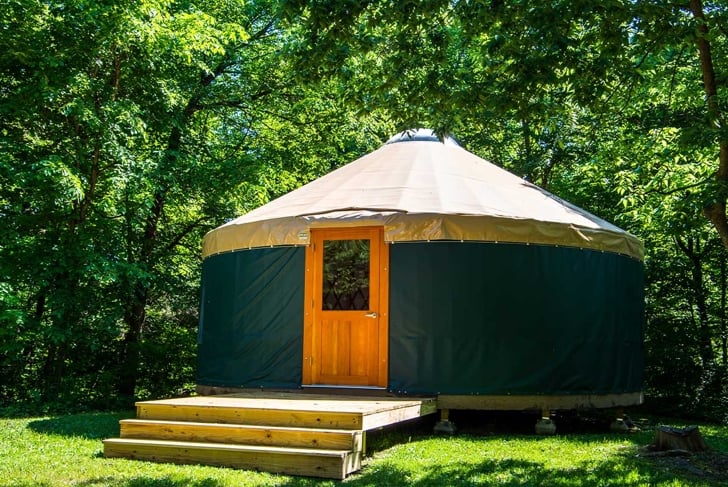
Sleep tourism refers to an increasing number of hotels, retreats, and resorts focusing on a different kind of nightlife—optimizing rest and ensuring guests get a good night’s sleep. A true sleep vacation is about resetting your sleeping patterns. That’s why some sleep-tourism destinations opt for open-air accommodations such as a yurt or a private home with plenty of natural light. This is designed to help sync up guests’ waking and sleeping habits with innate circadian rhythms.
Why is sleep tourism on the rise?
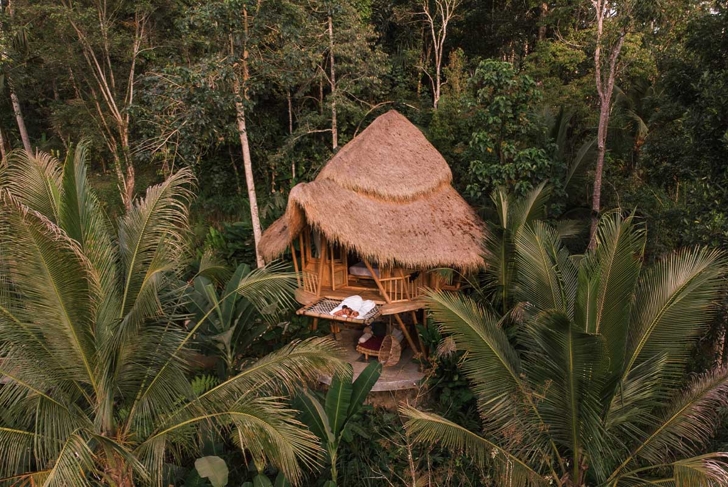
Sleep quality and mental health are not mutually exclusive. Of course, you may periodically get less sleep than your body requires. But long-term sleep deficiency can reduce your capacity to maintain holistic health. Occasional sleep deprivation can lead to drowsiness, difficulty concentrating, memory loss, and an impaired immune system. When insufficient sleep becomes the norm, anxiety, mood swings, depression, and heart disease become likelier. Lack of shuteye can have a domino effect on multiple aspects of health. For example, chronic anxiety can trigger other mental health issues or heighten physical symptoms of ongoing health concerns. This is especially troublesome for women and people of color. Compounding these issues, after the COVID-19 pandemic began in 2020, there was a surge in the number of people with diagnosed sleep issues around the world.
Why prioritize sleep when traveling?
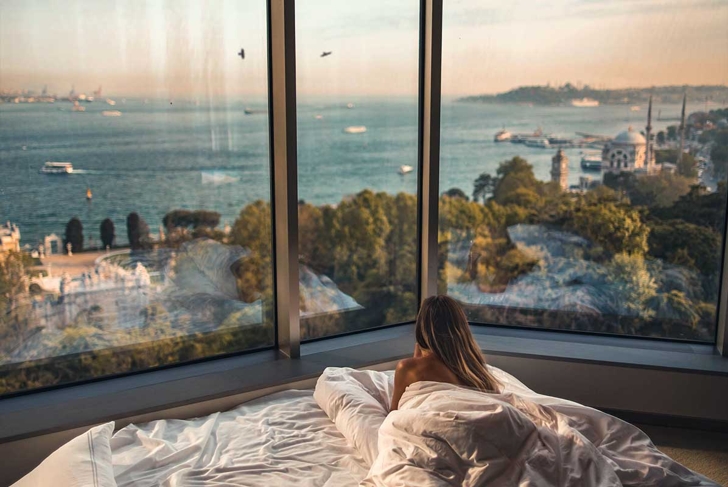
A main impetus for taking a mini-break or extended holiday is often to recharge on a holistic level. Plus, adequate rest is a vital component of maintaining physical and mental health.
“While modern wellness encompasses many therapies and modalities, sleep remains one of the pillars of wellness,” affirms Sundara Inn & Spa General Manager John Morris.
What sleep tourism options exist?

From luxury suites to secluded nature sanctuaries, sleep tourism comes in many forms:
- spas
- yoga retreats
- wellness resorts
- camping/glamping · meditation and mindfulness retreats
Check your local area (or dream destination) for getaways that suit your budget and preferences. To help inspire your next vacation, here are some serene accommodations that help guests travel to dreamland.
Carillon Miami Wellness Resort (Miami, Florida)

Each luxury apartment at Carillion has floor-to-ceiling windows so you can appreciate the sunrise and sunset along with an unobstructed view of the waves rolling into the shoreline. A personalized health itinerary can also be created by the hotel’s Concierge Wellness team upon request.
Sundara Inn & Spa (Wisconsin Dells, Wisconsin)

Sundara is tucked in a very tranquil parcel of pine trees. And the color palette of each spacious suite echoes the serene hues of nature. The intentionality of the resort’s wellness experience extends to the spa—every treatment is designed to relax both the mind and body. In addition, one of the regularly offered complimentary yoga classes is Unwind Yoga, specifically aimed to help initiate a restful night’s sleep.
WILDPOD (Tofino, British Columbia)

Surrounded by the UNESCO Clayoquot Sound Biosphere Reserve, each onsite glamping dome has a panoramic window with an ocean view as well as a private ocean-facing patio. This dreamy destination is intended for adults to enjoy solo. The prioritization of rest is equally evident in the no-tolerance noise curfew in place from 10 pm until 8 am daily.
WOODS on Pender (Pender Island, British Columbia)
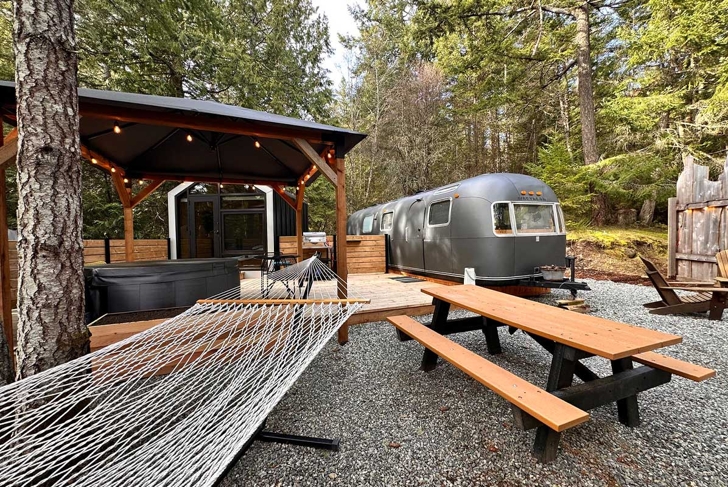
Stay in a secluded airstream on Pender Island. This budget-friendly getaway is a solid option if you’re looking for a low-key setting to soak up solace—sans children or pets. The hammock, kitchen, shower, and fire pit are all located outside to ensure guests spend as much time in nature as possible.
How can you support sleep while traveling?

If your vacation plans don’t include an emphasis on sleep or relaxation, don’t despair. There are many science-backed ways to support sleep while traveling.
Consider natural sleep aids. Melatonin can help combat jet lag, magnesium promotes relaxation, chamomile soothes as a herbal tea, and CBD may have a calming effect on the mind and body. Check with your health care practitioner to confirm which natural sleep aid may be right for you.
Keep moving. Spend time doing yoga, walking, running, or cycling every day of your vacation, especially if you struggle to stick to a consistent exercise routine at home.
Book a quiet room. Inquire if a property is strictly for adults or has adults-only areas prior to booking. It is also worth asking if there are “conversation-free” spaces inside (or outside) meant for guest use.
Maintain a consistent routine. Journal or practice mindfulness daily, preferably around the same time each day.
Do a digital detox. Look for spas or resorts that have electronics-free common areas for a digital detox. This may be particularly helpful if you struggle to disconnect from your smartphone.




